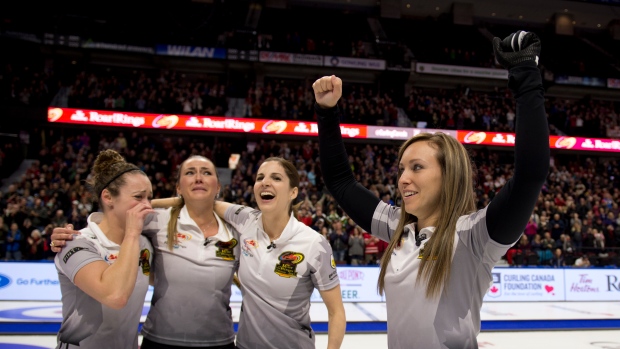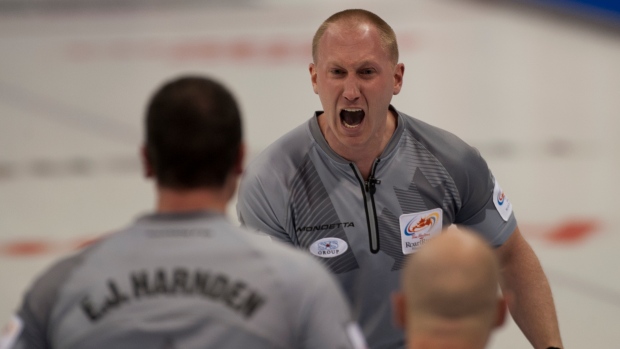Nov 19, 2021
Trials the ultimate test for Canadian curlers
The top nine men’s and women’s teams have gathered in Saskatoon to compete in what might very well be the most difficult event to win in the entire sport, Bob Weeks writes.
By Bob Weeks

For the past four years, Canada’s best curling teams have been in gyms working out, talking with sports psychologists, following the menus of nutritionists, testing the latest technology to help gain an edge, building team dynamics, travelling the world, and throwing lots and lots and lots of rocks.
All that hard work has brought the top nine men’s and women’s teams along different paths to Saskatoon, to what might very well be the most difficult event to win in the sport.
“There is no question this is the toughest event in curling to win,” said Cheryl Bernard, who led her team to victory at the 2009 Trials and then on to represent Canada at the 2010 Olympics. “This only comes every four years and it’s to go to an Olympic Games. Everyone has had to play at a super high level just to get here.”
This will be the eighth edition of the Trials. The first was back in 1987, when teams battled for the right to play at the Calgary Olympics where curling was a demonstration sport. That event featured some of Canada’s top teams as well as a few that were assembled by Curling Canada based on the metrics of individuals it believed would make the foursomes strong.
But it became better known for what happened off the ice. At pre-event testing, outspoken players Ed Werenich, Paul Savage, and others, were asked to lose weight. Rather than focusing on the curling, media headlines mocked diet plans and weigh-ins.
From that controversial start, the Trials began in earnest in 1997 when curling gained full Olympic medal status for the 1998 Games. Now, every four years, the country’s best teams battle it out for the right to wear Canadian colours at the Games.
It not only becomes a difficult challenge to win, but just to make it into the elite field. Teams get stronger, conditions get better, and the stature of the event grows. It has clearly surpassed both the Scotties Tournament of Hearts and the Tim Hortons Brier in overall difficulty and, for most teams, importance. A national championship is still a much sought-after title, but the Trials are a different animal all together.
“You’re essentially playing a triple-knockout against nine of probably the top 15 teams in the world,” said Brad Gushue, who won the Trials in 2005 and is in the field this week. “That in and of itself is challenging enough, but then you add in the factor that the winner of the event gets a life-changing experience, going to the
Olympics, while everybody else walks away with nothing. Certainly, the pressure is as high as it can be.”
“I think why everyone puts it on the pedestal is because you don’t just represent Canada at the World Championships, you’re representing the country at the Olympics,” said Ben Hebert, a two-time Trials winner who will play for Kevin Koe in Saskatoon. “It’s not just on the curling stage, it’s on the world sports stage. That’s why everybody claims it’s the big daddy of events.”
To get through this week will be no easy feat. At national championships, the difference between the best teams and those at the bottom of the talent pool can be wide. Only one team can play for traditional powerhouse provinces such as Alberta, Manitoba, and Ontario. At the Scotties and Brier, some rinks are full-time professional curlers while others play only in local clubs. That’s not the case at the Trials where the field is simply the best nine that make it.
The 18 teams took a variety of routes to reach Saskatoon, with the qualifying process altered due to the pandemic that cancelled several elite events. Rachel Homan and John Epping have had the longest wait, with both teams earning their places in the field by winning the 2019 Home Hardware Canada Cup.
The most recent qualifiers are Jason Gunnlaugson and Tanner Horgan on the men’s side and Krista McCarville and Jacqueline Harrison on the women’s. They advanced through the Home Hardware Pre-Trials qualifier just three weeks ago in Liverpool, N.S.
Every team has been working for the last four years to get into this field. Now that they are here, the real work begins. To win is a tall task with no shortcuts. It is mentally and physically demanding.
“There are no free spaces on the bingo card,” stated Russ Howard, an Olympic gold medallist and now a TSN commentator. “When you lose that first game, it’s a
scramble. If you’re playing Gushue the first game and lose, your next game might be against (Brad) Jacobs and then Koe. All of a sudden you can be 0-3. It’s who is the toughest mentally because they’re all good.”
“You can’t take any days off at a Trials,” Hebert added. “At a Brier you might get a couple of soft games during the week where you can coast through, rest the body, rest the mind. You’re not getting any of that at the Trials. Every single game and even more so every single shot of every end is high intensity.”
Sometimes the margin of victory can be one small break. In 2017, in a game against Jacobs, Gushue had an untimely pick on his last rock in the second end. That led to a steal of three for Jacobs and changed the outlook of the game, which Jacobs eventually won 7-4. Although it was only the fourth match of the round robin, who knows what a Gushue win instead of a loss there might have meant.
“It’s always a tough deal that when you don’t win, you look back at a shot or two that could have impacted you,” Gushue reflected. “You flip that around and win that
one, maybe we get the bye to the final instead of Koe and you never know. When you do win you look back, too. I look back to 2005, I made five or six shots to win games. These weren’t easy shots; these were challenging shots and any one of those flip around and we don’t win.”
In addition to making shots, dealing with the pressure can be overwhelming. The Trials represents the end of four years of slogging on curling sheets from one end of the country to the other. Lose and it’s another four years until there’s another chance. Carrying that make-or-break attitude every time a player steps into the hack can be a heavy burden.
In 2001, John Morris looked to be on his way to certain victory against Howard in a round-robin contest but gave up three to the veteran skip in the final end. The angst was too much for Morris who stormed from the ice and ripped his shirt off as if he was Hulk Hogan.
He is far from the only one to express disappointment at losing. As teams realize the end of their four-year dream, locker rooms are filled with tears and broken brooms.
“Everyone knows what’s at stake,” said Hebert. “You try not to let that creep into your mind but it’s hard to avoid.”
“You have to manage the intensity and the fatigue,” added Gushue, “because everybody is going to be so elevated so early on, and when you get to the end of the week the fatigue is going to set in for sure. Whoever manages that best is going to have a bit of an advantage.”
The teams that do win won’t get much of a break. The curling competition at the Beijing Games starts Feb. 2. That short span has been criticized by many Canadian teams that feel the turnaround is too tight and doesn’t allow them to properly prepare. It’s also filled with demands that leave little time to reflect on your win.
After she won the Trials, Bernard was pushed and pulled in every direction as she prepared for the Vancouver Games. But one night she finally found time to have a quiet, romantic dinner with her partner, Terry Meek. The steaks came off the barbeque, a nice bottle of wine was opened and just as they sat down for dinner, the doorbell rang. Two officials were there to take a surprise drug test on the Canadian skip who could only watch as Meek took his steak and wine down to the basement while she underwent the testing procedure.
“You get to celebrate for a very short period of time and suddenly it’s that overwhelming feeling of pressure and expectation put on us by our country,” said Bernard. “You don’t get much time on your own between the Trials and the Olympics.”
There is also the matter that Canadian teams are no sure bet to win a medal at the Olympics. In 2018, both the Koe and Homan teams failed to reach the podium. In many ways the Olympics is now just as difficult as the Trials.

“I think it’s been that way for a long time now,” stated Jennifer Jones, the 2014 gold medal-winning skip. “Even if you win the Trials there are no guarantees you will win a medal at the Olympics anymore. The international teams are very strong.”
Nicholas Edin and Anna Hasselborg from Sweden, Switzerland’s Silvana Tirinzoni and Peter De Cruz, and Bruce Mouat of Great Britain are just a few of the teams Canadian curlers will have to beat to reach the podium. All are near the top of the World Curling Tour rankings.
“Back when we won in ’05, the Olympics were much easier to win than the trials,” said Gushue. “This time around, that’s not going to be the case. I wouldn’t say it’s any harder to win the Olympics. I would say it’s very equal. You look at the top three or four teams internationally and you look at the top three or four teams in Canada, it’s an equal trade. You’re facing really tough teams in both.”
There will be no shortage of great shots and thrilling moments over the next week in Saskatoon. It’s been four years to get here and now the show is set to start. As for which team will win, there’s no easy way to figure that out.
“It’s so hard to predict and I think that’s the story,” stated Howard. “And nobody knows the ending.”
